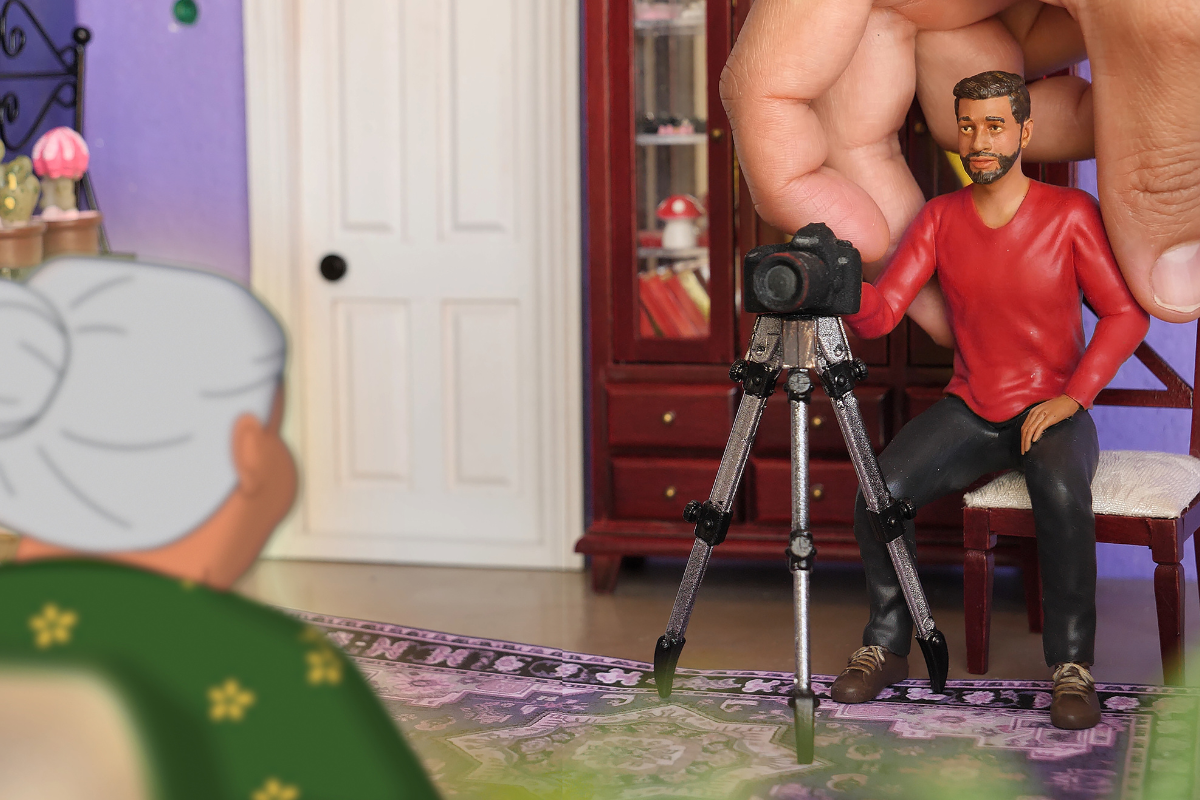LEGALLY SPEAKING, IT DEPENDS: “Amazing Grace” Ungraceful Exit
Christopher Schiller talks about the controversies surrounding ‘Amazing Grace,’ the film produced by Alan Elliot from original footage shot by director Sydney Pollack.
Christopher Schiller is a NY transactional entertainment attorney who counts many independent filmmakers and writers among his diverse client base. Follow Chris on Twitter @chrisschiller.
You may have heard news stories recently about Amazing Grace, the film produced by Alan Elliot from original footage shot by director, Sydney Pollack at the 1972 concert that became the basis for the hit live album, Amazing Grace for the singer and focus of the footage Aretha Franklin.
Mr. Elliot was planning to start the film's festival run at the recent Telluride Film Festival and continue on to several other festivals soon after. That was until Federal Judge John L. Kane issued an injunction against the film playing at the fest. Stories about the fallout have been fast and furious in the trade press. As is always the case, the details of what was what and what wasn't can get clouded. This article is an attempt to get a sense of the broad stroke details that may have caused the problems and give some approaches for future filmmakers to try to avoid a similar fate.
Pertinent facts on September 4th
On the first day of the Telluride Film Festival anticipation was high. The festival had not announced which films were actually playing until just prior to the festival opening, as unique an approach among festivals 42 years ago at the first one as it is still today. Though on this day, the announcement triggered a quick action seeking emergency injunctive from the Federal District Court for the District of Colorado (Civil Action No. 15-cv-1921). The plaintiff was Aretha Franklin, the defendant was National Film Preserve, Ltd. a/k/a The Telluride Film Festival.
When asked about the film's fate at the 1pm press orientation Julie Huntsinger, Executive Director of the festival, replied, “Lets just hope the paperwork that is there will let us show the film.” Her understanding was that it was at a stage where “two attorneys will have to talk to each other.”
“As far as we're concerned, we're showing the film.” That was a little after 1pm.
In conformance to the court's order at 3:43 pm, the festival issued an official notice that the film showings scheduled to start at 7:30pm that night were being replaced with other works.
Injunction details
The simplest boiling down of the allegations and resolutions in the court order are that Ms. Franklin would be irreparably harmed if the film is shown to the public without her consent and such consent is likely to be required if a court case continues to conclusion. The General Allegations section of her court filing subsection 3 states the damages Ms. Franklin fears most directly,
“Allowing the film to be shown violates Ms. Franklin’s contractual rights, her intellectual property rights, her rights to use and control her name and likeness, and represents an invasion of her privacy. It is also in direct and specific violation of the quitclaim agreement by which the footage was obtained from the Warner Brothers organization by Mr. Alan Elliott, the purported producer of “Amazing Grace:””
The court agreed. According to the court issued order, it is pretty clear to the judge that Ms. Franklin and Mr. Elliot did not reach an agreement to use the footage and that such agreement is most likely necessary.
“According to Ms. Franklin, she has never given the Telluride Film Festival, or any other entity, permission to show or display or distribute to the public, the footage of her concert performance.”
The injunction was issued with immediate effect and lasts at least 14 days, long past the end of this year's festival activities which have already concluded.
What does even some of this mean?
An injunction can be issued by a court when there is a need to say, “Whoa there!” to someone about to do something. That “something” could be about to start an action or stop doing an action currently ongoing. Since a court is loathe to step in until a lawsuit is completed to let both sides have a fair shot at presenting their sides of a dispute, an injunction isn't usually available until the decisions of the court are settled. But there are special circumstances that require that a judge step in early on in a case prior to its conclusion.
When there is a risk of irreparable damage, where the side seeking the injunction would suffer significantly and irrecoverably from the actions if allowed to happen, and the seeking side can show that there is a probable likelihood of success of winning the suit when all is said and done, then the judge can issue a preliminary, emergency or temporary injunction. These very similar forms of injunction have very limited scope and limited time frames, as minimal as necessary to prevent as much harm as possible to either side until the case has reached resolution. Usually a bond must be posted by the seeker just in case they end up not winning the case after all, to compensate the other side for the inconvenience of not being able to act as they'd wanted if they eventually win.
When a final determination by the court is reached, a temporary injunction can be made permanent, or extended or rendered moot (no longer relevant or applicable.)
Though there is much discussion both in the court documents and the press about rights of publicity, copyrights and the like, the most telling aspect of this decision rested on contract law.
The court stipulates that Mr. Elliot obtained the rights to the concert footage and sound from Warner Bros. through a quitclaim deedwhich is a way of acquiring a piece of property with no liability falling back on the seller whatsoever. Whatever obligations or claims to the property that may exist outside of the seller's control are now the risk of the buyer.
In what seemed the smoking gun aspect to this transfer for the judge, the quitclaim contract offered by Warner Bros. explicitly warned Elliot as Assignee,
“...Assignee specifically understands that Assignee will need to obtain authorization from Aretha Franklin. Without limiting the foregoing, with respect to any music included in the Material as exhibited, Assignee will obtain all necessary music synchronization and performance rights (particularly from Ms. Franklin) from the copyright proprietors of such music and such other persons or entities . . .” (emphasis added)
Further documents show that such authorization was acknowledged and sought by Mr. Elliot from Ms. Franklin several times through the years, but, the judge determined that as of September 4th, no required authorization was in existence when the injunction was considered and issued.
Who's affected and the echos that follow
There were only two direct parties involved in the litigation on September 4th. Aretha Franklin and the Telluride Film Festival were the direct parties with Alan Elliot involved as the film's producer. They were all affected by the injunction.
Though the injunction was only specifically directed to stop Telluride from showing the film and is only in effect for 14 days, that's not the only losses the filmmaker suffered. The Chicago International Film Festival issued a statement that they were withdrawing their plans for showing the doc. And even though Canada is a whole 'nother country (with its own legal system), the Toronto International Film Festival also chose to withdraw the film from its scheduled showings.
Because the injunction was only to stop showing the film at the Telluride Film Festival which has run its course already, and the injunction was time-limited for only fourteen days initially, it is unlikely that the decision will be appealable since it is now or will quickly become moot. But that doesn't mean the producers of the film will find easy sailing if they try to show the film again without gaining Ms. Franklin's permissions first.
Now for something completely different
IMPORTANT: From here on the rest of this articlemakes no direct implications or conclusions to draw from the facts of the situation or court case discussed above.
What follows is general information to assist other filmmakers in preparing for their own future forays with their own films.
Contractual terms should be concrete
Rights agreements live by their terms. Often, producers will seek rights, e.g. so called “life rights,” from potential parties involved in real life stories or documentaries. These may not be technically necessary. The party may not, in actuality, own the rights they are relinquishing, but the agreements reached are still enforceable if entered in good faith. If you know you don't own them, you can't sell them. But if you don't know, or think that you do and it's too much of a bother or expense to find out for certain, an agreement can be prudent to keep the production moving forward quickly.
Both sides must enter into any agreement discussions fully intending to abide by the resultant deal. Such agreements must be honored, unless nullified by a court or subsequent agreement or amendment to the original agreement. If you felt it was important enough to negotiate at one time, you must respect that act in future dealings.
Even if you later discover that you didn't need to enter into the negotiated agreement to get what you wanted, you still must abide by your contractual obligations. For example, an expired debt can be renewed, even though there is no longer an obligation to pay it if an offer or promise is made to do so anyway. The new agreement established a new playing field for the obligation. If you find yourself in a situation where you have entered into an agreement you didn't need to, you cannot unilaterally decide the agreement is no longer valid. You must either renegotiate or have the agreement modified or nullified by the courts.
Red flags are red for a reason
If you find yourself getting an unbelievable bargain or the path to success seems too easy, that's a red flag. Being skeptical and cautious never is a bad strategy, especially in this industry. Doing your due diligence with every opportunity presented to you is just good business practice. It can help you avoid those hidden pitfalls. And getting legal protections in place for those unexpected, out of the blue situations that might be in the woodwork is always a good investment.
If you don't prepare, research, and step cautiously, the damage may go way past your bottom line. Your reputation may be impaired. And for those who've read my column for any length of time, you'll recognize that sometimes, your reputation is your most valuable asset for the viability of the future of your career. If your actions in getting to market quickly or taking advantage of an opportunity before you are ready, end up placing the new parties you are attempting to join with in a difficult situation, they'll remember who put them there. And so will the rest of the industry.
Pay attention to contract details. If something's amiss or vague or not mentioned at all, ask why. If you aren't satisfied by the answer given, seek one on your own. If you can't find the answer, beware. Always consider potential 3rd party interests in your endeavors and investigate their legitimacy as much as you can while also securing sufficient indemnities from the other side to protect against them.
The details matter. Because, as always, it depends.
- More articles by Christopher Schiller
- Legally Speaking, It Depends – Writing Documentaries
- Film Festivals 101: The Essentials to Film Festival Success
Screenwriter Contracts Decoded
Types of Contracts a Screenwriter is Likely to Deal With
Empower Yourself to Make Sure You Get What You Deserve
Christopher Schiller is a NY transactional entertainment attorney who counts many independent filmmakers and writers among his diverse client base. He has an extensive personal history in production and screenwriting experience which benefits him in translating between “legalese” and the language of the creatives. The material he provides here is extremely general in application and therefore should never be taken as legal advice for a specific need. Always consult a knowledgeable attorney for your own legal issues. Because, legally speaking, it depends... always on the particular specifics in each case. Follow Chris on Twitter @chrisschiller or through his website.







